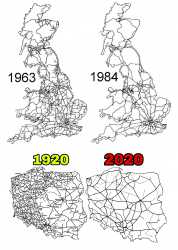>>2014363>>2014327>>2014057>>2013512>>2013627>>2013914There is way more to this than most people realize, way more than one post can summarize.
The 1980s were the dance on the titanic for Polish railways. Massive investments into modernization were made before the PZPR's collapsse into new stations, upgrades, maintenance, and new connections.
Electrification being prioritized above all else in the 1970's and 1980's resulted in non-electrified lines being written off as a loss.
PKP, the state railway company (called a state within a state) was broken up into smaller enterprises directed economically and also beheld to influence from local governments.
Ridership decreased from a billion yearly to less than a quarter after 20 years. Smaller countries like Czechoslovakia and Austria see higher per capita and overall ridership respectively despite being arguably worse off.
The total amount of railways was also cut by more than a quarter. No new lines have been built since the 1980s, more had been closed than highways and roads built.
Politicians, managerial elites, journalists, and economists spread ad-nauseum propaganda about trains carrying air even though every time they closed up a line, the last rides were always full of people (to the point where a police presence was set up incase people protested against the railway closure) whilst foreign ridership continued to rise.
These towns, villages, factories, and other places were effectively cut off from the world and socioeconomic activity afterwards. The largest being a 100,000 strong city, and a total of over 2 million people missing their trains (some just 10 years after operations began, see Jasztrzębie Zdrój or the Morcinek mine).
That's just the tip of the iceberg though.

